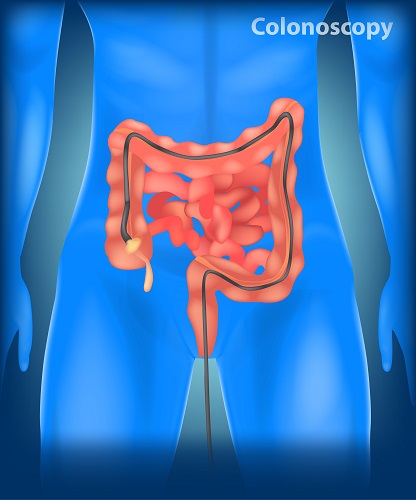Colonoscopy

What is the colon and rectum?
The colon and rectum are parts of the large intestine. The function of the large intestine is to convert the liquid stool from the small intestine into formed faecal matter.What is colonoscopy?
Colonoscopy is a safe and effective method of visualising the lining of the colon and rectum, using a long, flexible, tubular instrument. It is used to diagnose problems in the colon and rectum (e.g. colorectal cancer), perform biopsies, and remove colonic polyps. Most colonoscopies are performed on an outpatient basis with minimal inconvenience and discomfort.Who should have a colonoscopy?
Colonoscopy is recommended as a regular routine for adults aged 50 or older, as part of a colorectal cancer screening program. However, patients with a personal or family history of colon or rectal cancer, polyps, or inflammatory bowel diseases, may have their colonoscopy at an earlier age. Your doctor may also recommend a colonoscopy evaluation if you observe bleeding or blood in stools, test positive for blood in stool (FOBT), or experience changes in bowel habits, abdominal discomfort or pain, unexplained weight loss or anaemia. A colonoscopy is also necessary to verify findings of polyps or tumours seen in CT scans or barium enema examinations.How is colonoscopy performed?
The colon and rectum are parts of the large intestine. The function of the large intestine is to convert the liquid stool from the small intestine into formed faecal matter.>/p>
All patients will receive intravenous sedation for this procedure. The colonoscope is inserted into the rectum and is advanced to the caecum, the part of the colon where the small intestine joins the colon. During a complete examination of the large intestine, your doctor will remove polyps or take biopsies as necessary.
The entire procedure usually takes about half an hour. After the procedure, there may be slight abdominal discomfort or bloating sensation, which can be quickly resolved through expelling of gas. Most patients can resume their regular diet and activities the same day. You are advised not to drive for the next 24 hours after the procedure. You can return to work the next day.
What are the benefits of colonoscopy?
Colonoscopy is more accurate than an X-ray or CT scan (virtual colonoscopy) evaluation to detect polyps or early cancer. With colonoscopy, it is possible to remove polyps without abdominal surgery. Removing polyps early can prevent the development of colorectal cancer.

